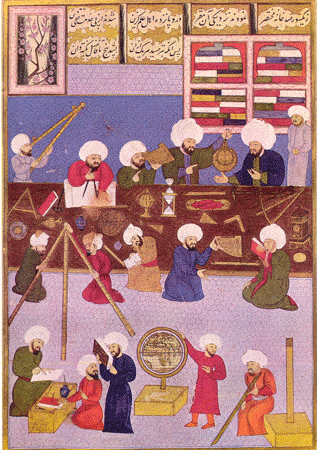Islam and science are closely related. Islam not only gives science a high priority, but it also strongly supports its pursuit. Islam does in fact view science as a necessary condition for human survival.
This seems strange. Typically, we perceive religion as being antagonistic against science. Between science and Christianity, wasn’t there a protracted war? Did the Church bring charges against Galileo? However, this “war” between “faith” and “science” was primarily a Western issue. Such mutual hostilities have no equivalent in Islam.
The most well-known Muslim scientists and inventors are discussed in today’s article, along with their amazing creations.
Islam, on the other hand, has always supported the pursuit of scientific knowledge. The Prophet Muhammad (PBUH) emphasized that only scientific investigation can provide an understanding of the material universe. He argued that Islamic culture was a knowledge-based civilization. One of his sayings was, “An hour’s study of nature is better than a year’s prayer,” and he favored science over extended religion. He instructed his followers to “go even as far as China in the pursuit of knowledge” and to “listen to the words of the scientist and instill unto others the lessons of science” for this reason.
Muslims place a great deal of stress on scientific knowledge because they consider the Quran to be the exact Word of God and clearly distinguish it from the Prophet Muhammad’s (PBUH) sayings. “Read” is the first Quranic word that was revealed to Prophet Muhammad (PBUH). It alludes to reading the “signs of God” or doing a methodical study of nature, among other reading techniques. The fundamental principle of Muslim thought is that there are many indications of God in the material world and that these signs can only be understood via reason and unbiased investigation. The Quran spends almost a third of its pages praising science, reason, and the careful study of the physical universe. The Quran instructs its readers to “acquire knowledge of all things” and to pray, “God increase me in knowledge.” One of the Quran’s most quoted verses is as follows: “Surely in the heavens and earth there are signs for the believers; and in your creation, and the crawling things He scatters abroad, there are signs for a people having sure faith, and in the alternation of night and day, and the provision God sends down from heaven, and therewith revives the earth after it is dead, and the turning about of the winds, there are signs for a people who understand” (45:3-5).
Islam and science should therefore get along well. From the eighth to the fifteenth centuries, during the classical era of Muslim civilization, religion was the driving force behind science. The underdevelopment and poverty that plague the modern Muslim world is directly related to the disregard for science. A substantial infusion of the scientific spirit in Muslim countries is necessary for the rebirth of Islam and the ensuing development of modern Islamic culture.
Early Muslim history provides a convincing illustration of the strong connection between Islam and science. The original impetus for scientific discovery came from religious demands. The requirements of the lunar Islamic calendar (which required seeing the new moon clearly) and the need to establish the correct date for the start of the fasting month of Ramadan, as well as the need to determine the precise time for daily prayers and the direction of Mecca from anywhere in the Muslim world, led to intense interest in celestial mechanics, optical and atmospheric physics, and spherical trigonometry. Islamic inheritance laws influenced the creation of algebra. A keen interest in geography, map-making, and navigational equipment was sparked by the religious duty of completing the annual pilgrimage to Mecca.
It was only natural for Muslims to become experts in ancient knowledge given the exceptional emphasis Islam placed on learning and research, as well as the significant responsibility that Muslim states took on themselves to support this endeavor.
Teams of translators painstakingly translated Greek thinking and knowledge into Arabic at the behest of power patrons. However, Muslims did not just replicate Greek knowledge slavishly; instead, they attempted to internalize it, apply its teachings to their own issues, and develop new ideas and strategies. Scholars like al-Kindi, al-Farabi, ibn Sina, ibn Tufayl, and ibn Rushd critically examined Greek philosophy in great detail.
Also Read: Famous Islamic Scholars and Scientists.

The empirical study of nature received substantial attention at the same period. The history of experimental science as we know it now may be traced to Muslim culture. The term “scientific method” originated from the efforts of individuals like Jabir ibn Hayan, who in the late eighth century built the groundwork for chemistry, and ibn al-Haytham, who founded optics as an experimental discipline. There was hardly a subject of study that Muslim scientists did not aggressively pursue or make an original contribution to, from astronomy to biology. Four establishments that are thought to be characteristic of the “Golden Age of Islam”—scientific libraries, universities, hospitals, and tools for scientific observation—can serve as illustrations of the nature and scope of this scientific activity (particularly, astronomical instruments such as celestial globes, astrolabes, sundials, and observatories).
The “House of Wisdom,” established in Baghdad by the Abbasid Caliph al-Mamun, was the most renowned library and was crucial in advancing scientific knowledge across the Islamic empire. The Caliph Hakam II of Cordoba’s library in Spain contained 400,000 volumes. From Cairo and Damascus to as far away as Samarkand and Bukhara, similar libraries thrived. At the Al-Azhar mosque in Cairo, the first university in history was founded in 970. Numerous additional universities in cities like Fez and Timbuktu followed it. Hospitals, which offered primarily free medical care, were institutions for training as well as theoretical and empirical research, just like universities. Both the Kabir an-Nuri Hospital in Damascus and the Abodi Hospital in Baghdad have established international reputations for their research output. Doctors had complete freedom to try new things, prescribe novel medications, and document their research in reports that the public could read. Muslim surgeons invented many of the common surgical instruments that are still used today. Similar to this, there were numerous observatories dispersed throughout the Muslim world; the most significant one was founded at Maragha in Azerbaijan by renowned astronomer Nasir al-Din al-Tusi, who created the “Tusi pair” that assisted Copernicus in formulating his theory.
Of course, all of this stands in stark contrast to how science and technology are currently perceived in the Muslim world. With the remarkable exception of Pakistani Noble Laureate Abdus Salam, Muslim societies have seldom ever produced scientists of note on a global scale. Most Muslim countries place very little emphasis on scientific research. What ever happened to “the marvel of Arab culture,” as science historian George Sarton put it? What can be done, then, to rekindle the spirit of science in Muslim societies?
There are several explanations for why science has become less important in Muslim civilization. Islamic law, family dynamics, and the absence of protestant ethics in Muslim society have all been blamed. Islam itself has been accused of being “anti-progressive” and “anti-science.” All of these hypotheses lack merit. The harsh reality is that Muslims intentionally and purposefully abandoned scientific investigation in favor of blind imitation and religious obscurantism.
Ijtihad, or systematic original thought, was the keystone of Islam’s worldview and the inspiration behind Muslim civilization’s scientific mentality. The powerful elite of religious scholars in Muslim society feared that ongoing and unabated ijtihad would weaken their position. They were especially troubled by the fact that philosophers and scientists had greater social standing than religious professors. So they united and shut “the gates of ijtihad.” They advocated taqlid, or imitating the ideas and contributions of past generations of scholars, as the way ahead. This was ostensibly a religious action. But because Islam has a fully integrated worldview and believes that everything is interconnected, it had a catastrophic effect on every type of inquiry.
Modern Muslim civilizations have a strong emotional bond with their scientific past. This bond frequently develops into a psychological complex that prevents Muslims from evaluating science objectively. Muslims must convey its spark in order to be true to their scientific heritage, rather than only preserving its ashes.
The future of Muslim countries depends on their interaction with science and education, just as the spirit of Islam throughout history was characterized by its scientific activity. The Muslims must actively work to reopen the doors of ijtihad and revert to original, methodical thought. And put science right in the center of Islamic culture, where it belongs.
Muslims need to first understand that science doesn’t have any easy fixes. Science, as well as the spirit of science, cannot be purchased or transferred. Science must be made relevant to the needs and demands of a people in order for it to arise within a community. Rolling up one’s sleeves and returning to the lab is the only option. In Muslim societies, science can only flourish by influencing and improving the lives of regular Muslims.
Read more Islamic Blogs and Articles. Or Check out our Instagram Feed.






